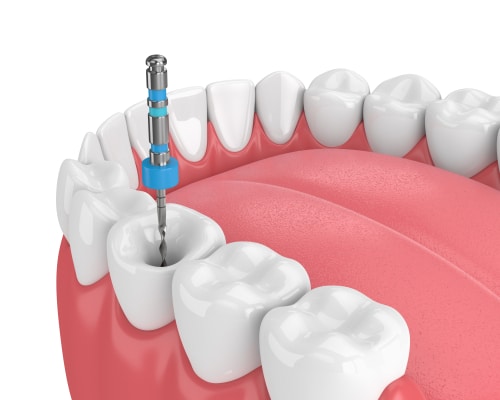Amherst Dentist Providing Affordable Root Canal Treatment in Buffalo, NY
When a tooth becomes infected, that infection can easily spread all the way through the center of the tooth, also known as the dental pulp. The dental pulp contains all the sensitive areas of your teeth including the nerves, connective tissue, and blood vessels. That’s why when you experience an infected tooth, it can cause unbearable pain and oftentimes require immediate treatment to help alleviate your pain. Root canal treatment, also known as root canal therapy or endodontic treatment is a treatment designed for damaged or cracked teeth with large cavities that have become inflamed and infected.
How Does Root Canal Treatment Work?
 When undergoing root canal treatment, your dentist will often remove the dental pulp and roots by creating a small hole in the tooth. Removal of the roots is not always necessary, but if indicated, it can help prevent further infection depending on the severity of the infection and whether it has reached the roots of your teeth. Once completed, the area is thoroughly cleaned to ensure the infection is fully eliminated and fully sealed using a substance called gutta-percha which has a rubber-like consistency.
When undergoing root canal treatment, your dentist will often remove the dental pulp and roots by creating a small hole in the tooth. Removal of the roots is not always necessary, but if indicated, it can help prevent further infection depending on the severity of the infection and whether it has reached the roots of your teeth. Once completed, the area is thoroughly cleaned to ensure the infection is fully eliminated and fully sealed using a substance called gutta-percha which has a rubber-like consistency.
This helps create a full seal of the areas where your dental pulp used to be. Oftentimes, your dentist will also prescribe antibiotics for you to take following treatment to ensure the infection is fully eradicated. If indicated, we may use a composite filling or crown over the tooth to help strengthen and protect the damaged tooth. At our office, we have the ability to match your filling and/or crown to the exact color of your natural tooth so it will blend in with your other teeth perfectly.
Root canal treatment is an outpatient procedure that doesn’t require sedation or narcotic medications, so once you’re done, you can drive home, back to work, or go about your day normally. Most patients don’t even experience pain after the procedure, however, they may experience numbness in the area for a short period of time while the novocaine wears off.
How Do I Know If I Need A Root Canal?
There are several telltale signs that you may require root canal treatment. If your teeth are infected, you may experience unusual sensitivity, particularly to cold or heat. This can suggest that there has been a weakening of the enamel, and pain in the gum or the tooth itself can accompany this discomfort. There may also be a change in color in the tooth or the gum below.
An abscess, which is a pus-filled swelling on the gum, is a clear hint that an infection has occurred, and purulent drainage (the seeping of pus into the mouth) can occur. Swelling and tenderness may even occur in the submandibular and submental lymph nodes, which are found on the underside of the chin and the lower jaw. Once an infection has permeated the tooth and spread to the pulp and the gums, root canal treatment offers the best chance at stopping the bacteria in their tracks.
How Much Does It Cost?
When discussing price there are always multiple factors that come into play. Generally, the price of a root canal can range anywhere from $300 to $2,000. The price depends on your dentist, location, and insurance. If you’re doing both a root canal and a crown the price still varies. It is also dependent on which teeth you are looking at when wanting to get work done. Your front tooth, back molar, and mid-molar are all around the same price of $1,000 without insurance. With insurance, these prices range from $300-$600.
Schedule A Free Consultation Today!
If you or someone you love is in pain and wonder if you may require root canal treatment, arrange a free consultation with dedicated Buffalo root canal dentist Dr. Douglas Hamill. With over 25 years of experience, he has helped countless patients alleviate their pain, improve their function, and enhance their appearance with affordable root canal therapy. Contact us today to arrange your free consultation and let his experience work for you. To learn more about root canal treatment, read these frequently asked questions by the American Association of Endodontists.
